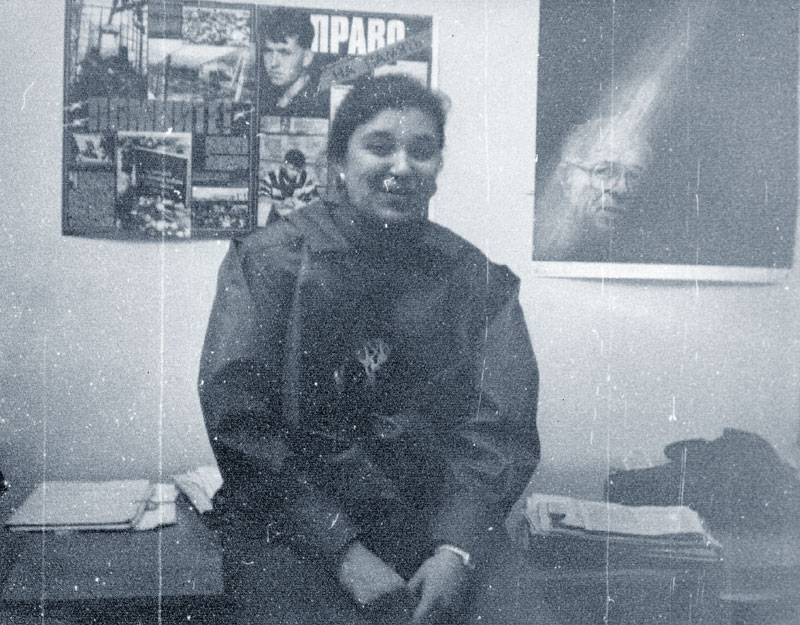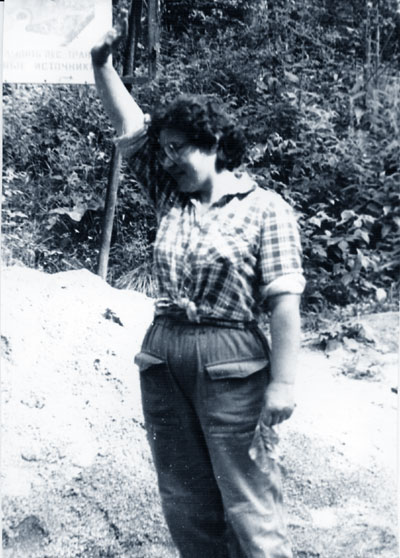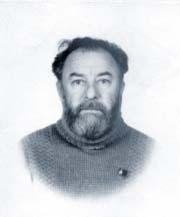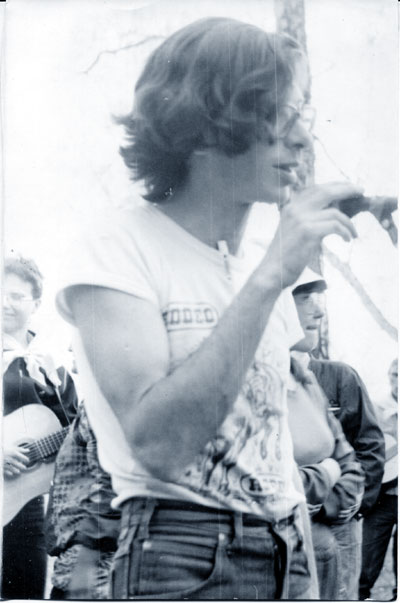









Not long ago, on the occasion of a formal meeting of the „inofficials“, someone, while pointing at me, said: „Look, that comrade from the „Pamyat“ („Memory“; translator’s note) organization just quite correctly remarked that ...“
This was a very hurtful statement – not only because we were mistaken just with the „Pamyat“ organization, which we have nothing to do with and which we do not intend to have any future dealings with either. The reason for why we felt so wounded was the simple fact that our organization had been principally mistaken with another one.
The point is that a member of „Memorial“, or a „memorialist“, as we would call him on our jargon, leads a very special ( but not at all isolated) life. In his entire leisure time his thoughts will revolve round prisons, the undefinable balanda (thin prison or camp soup; translator’s note), internal exile, informers and other unpleasant things. A life without „Memorial“ seems to be unconceivable to him. We know a story about a „memorialist“, who went to the movies with his wife. The film was called „The loner“, and when Jean-Paul Belmondo appeared on the screen, just trying to SQUEEZE a confession out of a suspect, this „memorialist“ almost automatically started to fill in a so-called „executioner index card“: „Illegal methods during the preliminary proceedings. Paris. Happened in the 1970s ...“
If a „memorialist“ talks to former victims of political reprisals - „zeks“ („prisoners“; translator’s note) or „starichki“ („little old men“; translator’s note) – then he treats them as his equal: like all the former prisoners he is also well aware of the fact, who was predestined to sleep directly beside the pale with the human excrements (the latrine bucket), under the plank beds or „in the middle“, how much weighed the daily bread ration, what did they make the undefinable watery soup of, and so on, up to the point, how women solved their very specific problems, when only receiving two jugs of water per day: should they drink it or better have a wash? The „memorialist“ is well versed with the different paragraphs of the famous section 58, the decrees of the Presidium of the Supreme Soviet of the USSR and the resolutions of the Central Committee. The „memorialists“ also dispose of a rather peculiar kind of humour, which they mainly adopted from the camp folklore; according to the opinion of outsiders this humour is too gloomy, but this is just what gives expression to the characteristics of the society. „Memorial“ is no semi-official administrative body, but, in the true sense of the word, an unconstrained collective of friends and like-minded persons. A collective, where people do their work without being under duress, where the worst punishment would be the suspension of tasks, applying to those, who distrust, to those, who consider „Memorial“ as a means of being paid a dividend. The „memorialists“ are spending most of their energy, time and experience to help people.
For that reason, whenever you come across people who do not know about „Memorial“ at all, the first thought will inevitably be: how can that be possible? The second thought: we probably do not work well enough ...
 But one cannot say that we work badly. One year ago, for example, we declared
that we would one day recall EACH victim of political reprisals by name, and in
our index files we have already registered the names of more than 4000 people.
Of course, they merely represent one tenth, more likely one hundredth or maybe
even the thousandth part of all victims in the Krasnoyarsk region, but we have
to take into consideration that, in order to find out details about a single
family name, we often have to undertake trips, investigate, write lots of
letters, until the fate of the persons concerned are finally completely
reconstructed. We also have to consider that we do all this work in our free
time, beside our regular professional duties, without suitable premises or
working materials and office equipment. Under these circumstances , I think, we
are not doing a bad job at all!
But one cannot say that we work badly. One year ago, for example, we declared
that we would one day recall EACH victim of political reprisals by name, and in
our index files we have already registered the names of more than 4000 people.
Of course, they merely represent one tenth, more likely one hundredth or maybe
even the thousandth part of all victims in the Krasnoyarsk region, but we have
to take into consideration that, in order to find out details about a single
family name, we often have to undertake trips, investigate, write lots of
letters, until the fate of the persons concerned are finally completely
reconstructed. We also have to consider that we do all this work in our free
time, beside our regular professional duties, without suitable premises or
working materials and office equipment. Under these circumstances , I think, we
are not doing a bad job at all!
 And our former „starichki“? First of all you have to become acquainted,
then you start to question them and afterwards – you have to make phonecalls,
enquire after their health and thrn set off to meet or even visit them. Some of
them we assist to write the necessary papers to apply to the authorities for
their rehabilitation, the next you ask questions about the fate of his parents,
and others you listen and talk to.
And our former „starichki“? First of all you have to become acquainted,
then you start to question them and afterwards – you have to make phonecalls,
enquire after their health and thrn set off to meet or even visit them. Some of
them we assist to write the necessary papers to apply to the authorities for
their rehabilitation, the next you ask questions about the fate of his parents,
and others you listen and talk to.
And what about the Baltic and German sections, where we can find so many victims of political reprisals? And what about the so-called „various different things“ our work consists of? Let us take a few examples from the year 1989:
1. Yekaterina Ivanovna Murnova called from Moscow: she had received a reply from the Krasnoyarsk UVD (Administration of the Interior; translator’s note) that her father , a former victim of political reprisals, had been buried on the Torgaminsk cemetery; the exact burial plot, however, was unknown. She asked us to find the grave, so that one could take her to the place, when she would come to Krasnoyarsk one day. We went there, looked at everything. The cemetery was in a terrible state: no tomb-numbers, no tomb-stones, even a cemetery attendant was nowhere to be found. We defined a square of a few dozen meters in size, where the tomb was supposed to be situated in all probability. And now we are waiting for Yekaterina Ivanovna to be able to show the place to her.
 2. Oleg Borovykh from Uzhur was aware of the fact that his grandfather had
served his term in a camp near the station of Kach. He asked: are there any
victims of political reprisals who were imprisonned in the same camp and
survived? We looked through the index files and found one man: well, he had been
to that camp during the war, while Oleg’s grandfather died in the 1040s, but
nevertheless ...
2. Oleg Borovykh from Uzhur was aware of the fact that his grandfather had
served his term in a camp near the station of Kach. He asked: are there any
victims of political reprisals who were imprisonned in the same camp and
survived? We looked through the index files and found one man: well, he had been
to that camp during the war, while Oleg’s grandfather died in the 1040s, but
nevertheless ...
3. In the „Krasnoyarsk Komsomol“ they published an article telling the reader that during the years of political reprisals 87 people had been arrested on one village only. We will have to find the author of this article, find out the names of the victims and enter them into our index files.
4. A former victim of reprisals, Nina Grigorievna Kulinich turned to us for advice and help: her nephew tried to throw her out of the apartment; he had already registered the telephone in his name - the telephone that had actually been assigned to her husband for being a veteran of war. Her nephew was drunk every day and uttered threats all the time. We went there: the room was in a mess, the door leading to it had been liftet out of the door-hinges, the telephone was locked. We went to the authorized district representative , the State telecommunication office, the district area court, the department of justice, the Soviet of veterans and called in lawyers from the "Legal Advice" Association. Something started to move, but it is still a long way to sufficiently clear the whole messed-up situation. The problem will probably be completely solved, as soon as the nephew has been assigned a separate apartment ...
5. In Stepnoy Badzhey there is a Lithuanian cemetery. Which time do the first burial grounds originate from? Is there any connection to the deportations of Lithuanians to Siberia in 1941? One has to go there, make inquiries, get information.
... and so on and so forth. August, September, October, and time is passing by and by - and our work goes onand on. After we come back from our regular work in the evening, on weekends, during the vacation ... 3-4 hours every day.
 No, there was and is a lot of work to do. But all these activities take place
"in the dark", silently, invisibly. One the one hand this is a
positive aspect: generally speaking, such a concrete work needs to be done. On
the other side we are an organization which intends to enlighten the people on
historical events. Our main aim is to contribute to the destalinization of our
country, and this menas that we need to have an effect on the conscience of the
people. If you want to get out of a prison, you first must realize that you are
in a prison. I will never forget a woman, whose father had been executed in
1938. She and her mother had been in prison for several years; she had lead a
life without ever living in an apartment of her own, a life without family,
practically in dire poverty - and now she was looking for a "strong
hand" to furnish her with detergent powder, sugar and tea. And maybe with
soap, too, I tried to convince her; but she is not going to soap herself: she
allows her thoughts to wander! All efforts are in vain. And how many people are
yearning for a new leadership with the old order ... It seems that we have not
yet suceeded to sufficiently informing them about the times of the "strong
hand" and that we did not do our job well enough! Well, we held a lot of
lectures, organized meetings and exhibitions, wrote various articles; there is a
special section in the "Yenissey" year-book; tehre were television
reports, but almost no mass campaigns: we did not organize a meeting on the
occasion of the 50th anniversary of the Molotov-Ribbentrop Pact on the 23rd of
August, we did not demonstrate our position during the congress of the people's
deputies, although all sorts of things affected us directly. Of course, we stood
on the Revolution Square on the 40th anniversary of the occurrences in Tbilisi -
with burning candles in our hands. Of course, on the 14th of June, the
anniversary of the deportations from the Baltic states, we solemnly lowered
wreaths to the waters of the Yenissey. Of course, we collected signatures for
A.D. Sakharov's "Decree about the Power" (Sakharov is OUR DEPUTEE: the
chairman of the "Memorial" board). But lots of things were neglected,
remained unachieved or have never been thought of. For every single failure we
have to criticize ourselves: we do not render account to anybody. For that
reason we judge ourselves in a rather rigid way. If the Stalinist times are
coming back, then we are guilty, too.
No, there was and is a lot of work to do. But all these activities take place
"in the dark", silently, invisibly. One the one hand this is a
positive aspect: generally speaking, such a concrete work needs to be done. On
the other side we are an organization which intends to enlighten the people on
historical events. Our main aim is to contribute to the destalinization of our
country, and this menas that we need to have an effect on the conscience of the
people. If you want to get out of a prison, you first must realize that you are
in a prison. I will never forget a woman, whose father had been executed in
1938. She and her mother had been in prison for several years; she had lead a
life without ever living in an apartment of her own, a life without family,
practically in dire poverty - and now she was looking for a "strong
hand" to furnish her with detergent powder, sugar and tea. And maybe with
soap, too, I tried to convince her; but she is not going to soap herself: she
allows her thoughts to wander! All efforts are in vain. And how many people are
yearning for a new leadership with the old order ... It seems that we have not
yet suceeded to sufficiently informing them about the times of the "strong
hand" and that we did not do our job well enough! Well, we held a lot of
lectures, organized meetings and exhibitions, wrote various articles; there is a
special section in the "Yenissey" year-book; tehre were television
reports, but almost no mass campaigns: we did not organize a meeting on the
occasion of the 50th anniversary of the Molotov-Ribbentrop Pact on the 23rd of
August, we did not demonstrate our position during the congress of the people's
deputies, although all sorts of things affected us directly. Of course, we stood
on the Revolution Square on the 40th anniversary of the occurrences in Tbilisi -
with burning candles in our hands. Of course, on the 14th of June, the
anniversary of the deportations from the Baltic states, we solemnly lowered
wreaths to the waters of the Yenissey. Of course, we collected signatures for
A.D. Sakharov's "Decree about the Power" (Sakharov is OUR DEPUTEE: the
chairman of the "Memorial" board). But lots of things were neglected,
remained unachieved or have never been thought of. For every single failure we
have to criticize ourselves: we do not render account to anybody. For that
reason we judge ourselves in a rather rigid way. If the Stalinist times are
coming back, then we are guilty, too.
At the moment we have problems to get near to the younger people; most of the Memorialists are at least 30 years old, many even much older. And yet "Memorial" would offer a wide-spread field of activities to history teachers, as well as to students of the historical faculty. There is, for example, a certain Feofan Mikhailovich Popkov, teacher in the village of Uspenka, Rybinsk district, and his pupils are making out a list of victims of political reprisals - all neighbours from the same village. Fine fellows! I believe it makes a big difference, whether children learn from a newspaper that such and such a million of farmers (a million more, a million less) were exterminated during the collectivization period, or listen devoutly to the story of a former "dispossessed kulak", the long-known grandfather "Musha", and feel in the bottom of their hearts that all these people were not merely impersonal millions, but millions of victims - just like that very grandfather Misha. And why should we not make up such lists for every village? And why not chisel all THESE names in a stone - why only the family names of war victims? "Memorial" promises to assist in word and deed!
There still exists another question concerning our relationship with the state institutions. The members of "Memorial" are also members of the coordination counsil of the Central District Committee of the Communist Party of the Soviet Union, and we also maintain relations to the welfare commissions, which support the victims of political reprisals, but so far we are not officially represented there, in spite of a sufficient number of formal requests addressed to the superior authorities. On the occasion of the meeting of the "inofficals" O.S. Shenin, too, was of the opinion that we should, in fact, be represented in this commission. However, we are unable to clarify some problems and questions ourselves. Well then - let the KGB and MVD pretend not to know, where the dead bodies of the people executed thirty years ago are buried: we do not write any applications, but simply equip ourselves with shovels and then go and search ourselves. Half a year passed by, since "Memorial" sent in a list comprising the names of 20 former victims of reprisals to the city executive committee; these people are now urgently waiting for an official decision about their social everyday worries. One of them meanwhile passed away, and the City Executive Committee wraps itself in silence. In close cooperation with the Central District Committee of the Communist Party we presented a number of very concrete suggestions to the Regional Committee: to grant the former victims of political reprisals social and financial allowances, analogous to the allowances for war veterans, to make suitable premises available to the "Memorial" organization, where its members can do their work in an appropriate way, to arrange a special "Memorial" section in the district newspaper and to publish the lists of victims of political reprisals from the Krasnoyarsk region. We are waiting for a reply. And while we, "Memorial", are setting up an organization for the victims of political reprisals, we will also accelerate the progress of establishing good contacts with the City Counsil of the War Veterans. The problems of the former victims of political reprisals have to be solved urgently: in many cities they have already been accorded equal status to the war veterans and obtain financial support. However, due to the advanced age of the victims, we must hurry up in this matter and avoid coming too late.
"Memorial" has already developed into quite a mature organization, so that it is not merely dealing with former days. "Memorial" has, in fact, become a "MOVEMENT" that undertakes every possible effort to destalinize our society, our present society. For that reason we are right now undergoing a reversal to the presence, however, without neglecting our historical studies of the past. Without forgetting about our historical research, we devote ourselves to the necessary social work.
A review from inside by Alexey Babiy, on behalf of the
"Memorialists"
Published in: "Krasnoyarsk Komsomolets",1989